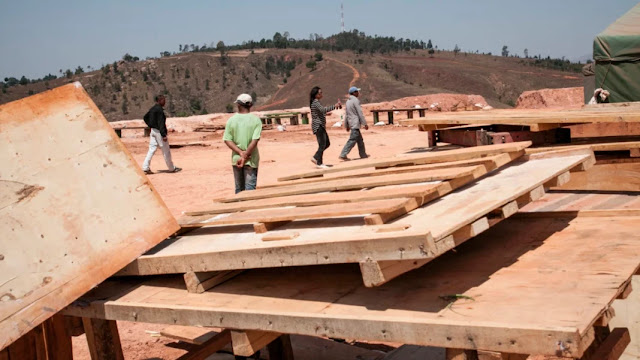Chinese companies operating in Zimbabwe that are accused of abusing local workers have resorted to targeting their critics in an elaborate smear campaign that involves the state-controlled media, it has emerged.
A number of companies from China, especially in the mining
sector, have in the past been exposed for under-paying or ill-treating their
employees.
In May this year The Standard published a story about an
assault case involving Kudakwashe Nengomasha, who was allegedly assaulted by
his former Chinese supervisor at Zhong Jian coal mine in Hwange.
The exposé was part of an investigation supported by the
Information for Development Trust (IDT), a non-profit organisation helping
journalists probe corruption and bad governance in Zimbabwe and southern
Africa.
It has since emerged that after the publication of the
story unidentified individuals descended on the Zhong Jian mine to interview
workers about Nengomasha’s alleged assault in the presence of their Chinese
supervisors.
Zhong Jian workers said they were interviewed by three
people they believed were from a state security agency, who asked them whether
it was true that some of them were assaulted by Chinese supervisors.
“The questions were direct and people feared for their
lives because the same supervisors that could be the perpetrators would
immediately fire them,” one of the employees said.
He said there were several cases of assault at the mine,
some which involved drivers that were dismissed for retaliating against Chinese
supervisors that attacked them.
On June 20, an obscure publication known as Review&Mail
run by former acting editor of the Herald Tichaona Zindoga ran a story titled,
‘Investigation debunks abuse allegations of employees by Chinese mining
companies in Zimbabwe,’ which sought to
rubbish the story by The Standard.
The publication quoted Nengomasha claiming that his
supervisor only sprinkled water on him and he was not assaulted as he tried to
recant the story he gave to The Standard detailing the alleged assault and
attempts to cover it up.
It is not clear why Nengomasha is now changing the story.
He was allegedly assaulted on two different occasions by
the same supervisor and a report was made to the police after he received
treatment at a local hospital.
Matabeleland North police refused to comment on the matter,
describing it as sensitive since it involved a foreign national.
Zindonga is a public relations consultant for some Chinese
companies and regularly uses his publication to vigorously defend Chinese
interests in Zimbabwe.
On the day the purported investigation was published, a
reporter from the Herald who identified himself as Gibson Nyakadzino contacted
local media organisations such as the Voluntary Media Council of Zimbabwe,
Zimbabwe National Editors Forum and the Zimbabwe Union of Journalists (ZUJ)
trying to cajole them into condemning
The Standard for exposing the alleged abuse of workers at Zhong Jian.
The following day The Herald ran a story titled ‘Unethical
journalism practices on Chinese firm flagged.’
It accused The Standard of lying about Nengomasha’s case
and based its claims on the alleged interviews with Zhong Jian employees.
Nyakadzino’s story, which did not carry a byline, quoted
ZUJ acting president Michael Chideme saying his organisation was working with
the Zimbabwe-China Friendship Association “to go and verify matters” over the
alleged abuse at the Hwange coal mines.
Both stories were subsequently used by the Chinese embassy
in Harare to attack The Standard for allegedly publishing fake stories in what
appeared to be a choreographed operation involving Zindoga’s publication, the
Herald, state security agencies Zhong Jian and the embassy.
This publication has recordings of Nengomasha and other
Zhong Jian workers narrating their alleged abuse at the hands of Chinese
supervisors at the mine.
Nengomasha said he was now employed by Tutu Coking Coal,
another Chinese owned firm operating in the Hwange area after he lost his job
at Zhong Jian following the assault case.
Chamber of Chinese Enterprises in Zimbabwe secretary
general Li Wenjie said their organisation did not support unethical conduct by
its members and revealed that
investigations were underway to expose those flouting local laws.
“We are doing investigations,” Li said.
“We are going to invite people in the relevant government
departments to come and do proper investigations.
“If it’s true, there will be consequences.
“There are laws in Zimbabwe and if they abuse the workers,
the Labour Court will deal with that.
“We are not trying to cover up anything for them, no.
“We are in Zimbabwe and if you are a company operating in
Zimbabwe, there are rules and laws that (need to be followed).”
Prince Mpunzi, the Solidarity Mine Workers’ Union of
Zimbabwe secretary general, said complaints of labour rights abuses at some
Chinese owned mines were genuine and must be addressed.
“As a trade union, we don’t just bring some stories from
nowhere,” Mpunzi said.
“We speak about things we see on the ground. We go on the
ground and we hear the grievances from the employees.
“In Hwange, there is (a Chinese owned mine) where employees
are underpaid and are being forced to sign contracts with no figures of what
they are going to earn and after they have signed, the employer will come and
say now you are earning $58 000 instead of $93 000 as per the National
Employment Council.
“The United States dollar is not even included, which is an
unfair labour practice.”
Zimbabwe Congress of Trade Unions secretary general Japhet
Moyo said attempts by the Chinese embassy to deflect attention over alleged
transgressions by companies from that country were deeply worrying.
“Every time when you speak about the Chinese abusing
workers, their Foreign Affairs ministry is the first to respond,” Moyo said.
“So they don’t regard labour issues as labour issues, but
as a foreign affairs issue, which is wrong.
“They spin issues. The Chinese are wrong and there are
massive gaps that need to be filled.”
Zimbabwe Diamond Allied and Minerals Workers Union general
secretary Justice Chinhema expressed similar sentiments, saying abuse of
workers was rampant at some of the Chinese owned mines. Standard









0 comments:
Post a Comment